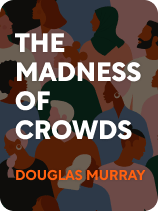

This article is an excerpt from the Shortform book guide to "The Madness of Crowds" by Douglas Murray. Shortform has the world's best summaries and analyses of books you should be reading.
Like this article? Sign up for a free trial here.
What stabilizes society? What are Grand Narratives, and how do they help people find meaning?
Douglas Murray believes there’s an important connection between the stability of a society and the ability of people to find meaning in life. Further, he contends that certain traditional institutions and belief systems provide that all-important meaning that contributes to social order.
Read more to understand why Murray thinks liberalism and religion are central to a strong society.
Liberalism and Religion in Society
First, Murray argues the New Ideology partly developed due to the decline of several major belief systems that previously stabilized Western society: most notably, traditional religion and traditional liberalism. Liberalism and religion offered society stability because they gave life meaning through big-picture explanations of how the world works. Liberalism argued that human reason (our ability to seek and reveal truth through the use of intellect, logic, and observation), and our corresponding ability to improve the world, was the most impactful force. Traditional religion argued that divine planning shaped events.
(Shortform note: Traditional liberalism and religion are arguably both examples of “Grand Narratives”: belief systems that, as Murray notes, try to explain why things are the way they are. While Murray focuses on the positives of such systems—for instance, the stability they may bring—others argue that Grand Narratives bring downsides. For example, they often involve a certain group being painted as an “enemy” or an adversary to conquer, breeding conflict and violence. They can also reduce complex chains of events down to oversimplistic stories.)
In the 19th century, traditional liberalism and religion (along with other major political ideologies) increasingly lost their credibility. According to Murray, the resulting vacuum was then filled by postmodernism. This intellectual and artistic movement argued that universal truths and movements that forward them are untrustworthy and that the human condition is instead prone to ever-more fragmented varieties of experience.
Ultimately, Murray concludes, the decline of liberalism and religion drove people to find new forms of meaning. Many did so by identifying with smaller and smaller groups based on immutable characteristics like race, gender, and sexual orientation. Eventually, the act of fighting to protect these groups from perceived victimization appeared to offer a new, higher morality to replace those that religion and liberalism previously provided.
(Shortform note: The distrust of universal truths is only one feature of postmodern philosophy. It also argues that human society has shifted toward consumerism: the idea that we increasingly build our identities based on the kinds of goods and services we buy and that the options available to us are becoming increasingly diverse. Further, postmodernism argues that Western societies have become much more culturally diverse due to patterns of immigration and globalization. This philosophy ultimately contends that phenomena like consumerism and globalization drive us from collective identities to increasingly smaller ones and that commonalities become harder and harder to find.)
| Nationalism and Identity While Murray mentions several major modern historical developments as being important to the evolution of Western identity politics, he doesn’t address the rise of nationalism: strong identification with one’s country, its needs, and its characteristics. Nationalism developed in the Americas and Europe in the 18th and 19th centuries, before spreading to Africa and Asia in the 20th century. Many historians argue that the concept of nationalism is indispensable for understanding how modern individuals perceive themselves and others, particularly for how they define belonging. For example, in Imagined Communities, historian Benedict Anderson argues that nationalism is a political idea that’s meant to encourage people to identify themselves as members of unified communities with specific, unique, internal identities and interests. Moreover, according to nationalism, the group should doggedly pursue these interests, even if they’re detrimental to those outside the group. Nationalism, many might then argue, is one of the most important precursors for the highly competitive, mutually antagonistic brand of identity politics Murray believes is so dangerous in contemporary society. |

———End of Preview———
Like what you just read? Read the rest of the world's best book summary and analysis of Douglas Murray's "The Madness of Crowds" at Shortform.
Here's what you'll find in our full The Madness of Crowds summary:
- That Western society is consumed by social justice and identity politics
- Why we must combat this ideology and restore opportunities for disagreement
- How conservative viewpoints are being silenced and possible remedies






